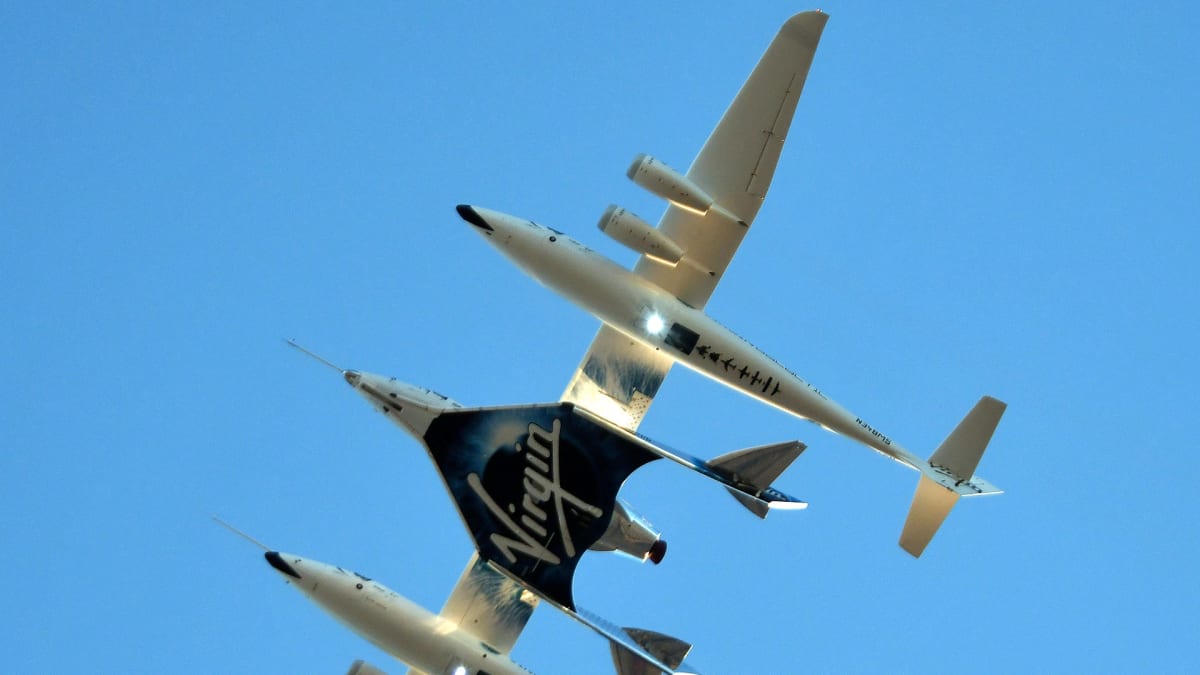
The three-headed billionaire's space race is turning out to really be just a two-man competition as Richard Branson's Virgin Orbit (VORB) failed to complete its mission Monday night.
Monday's launch was supposed to be historic with Virgin launching satellites into orbit from British soil at Spaceport Cornwall for the first time ever.
Virgin's jumbo jet, Cosmic Girl, successfully took off, climbing 35,000 feet, before its LauncherOne rocket detached and successfully reached space.
However, with the rocket traveling at more than 11,000 miles per hour during the firing of its second stage engine, its system "experienced an anomaly" and the mission was deemed a failure.
"While we are very proud of the many things that we successfully achieved as part of this mission, we are mindful that we failed to provide our customers with the launch service they deserve," Virgin Orbit CEO Dan Hart said.
Virgin Orbit shares came crashing down to earth on the news, falling more than 16% at last check on Tuesday morning.
Space Race Heats Up
While Richard Branson is falling behind the pace setters in the space race, the rivalry between Elon Musk and Jeff Bezos, two of the world's wealthiest men, is heating up.
The Musk founded rocket-tech company SpaceX has seen its shares of wins and losses, as has Bezos and the space company he founded, Blue Origin.
But the success of the companies allows the U.S. government to continue its space ambitions at a fraction of the cost thanks to outsourcing.
The U.S. military is reportedly signing deals with commercial space companies to explore the idea of using rockets typically tasked with launching satellites or astronauts into space to shuttle military cargo around the world at record speeds.
Space Commercialization
There's plenty of controversy still on the ground, though. Astrophysicist Neil Degrasse Tyson recently faced backlash on social media after he tweeted praise for Tesla (TSLA) chief Elon Musk and his commercialization of space through SpaceX.
Many users pointed out that "commercializing" things on earth like healthcare and politics has led to disastrous results.
Musk, Bezos, and to some extent Branson, aren't commercializing space. They are commercializing space travel, and the difference has turned what was once an unimportant part of the government's budget into a bustling industry in the hands of private enterprise.
However, while SpaceX and Jeff Bezos' Blue Origin have been successful in doing what NASA hasn't been able to in the past few decades, private investment in the space seems to be dwindling.
Space Capital, which describes itself as a seed stage venture capital firm investing in the space economy, released a third-quarter report October 18 that describes a downturn in the investment climate around space ventures.
Space Capital founder and managing partner Chad Anderson told TheStreet that a risk averse environment has caused the investment volume in space to fall significantly more than the broader market.
"In fact, Q3 is one of the lowest quarters for private investment in space over the last five years," he said.
Total investment year to date saw a steep decline versus last year, although early-stage investments have increased over that same period. Early-stage infrastructure activity was flat compared to last year, while distribution and applications witnessed declines.







